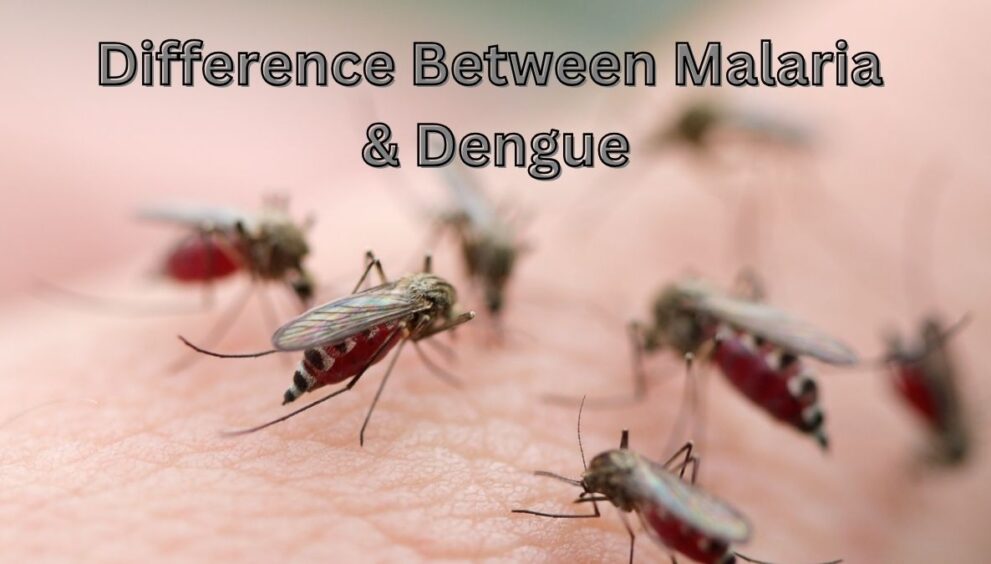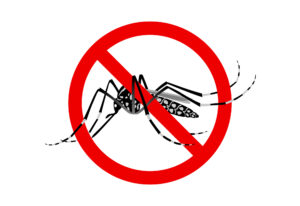Difference Between Malaria and Dengue

Malaria and dengue are both mosquito-borne diseases, but they are caused by different pathogens and have distinct symptoms, treatments, and preventive measures. The main difference between Malaria and Dengue is that Malaria is caused by a parasite called Plasmodium, which is transmitted through the bites of infected Anopheles mosquitoes. In contrast, Dengue is caused by the dengue virus, which is transmitted through the bites of infected Aedes mosquitoes.

Malaria symptoms typically include fever, chills, headache, nausea, and fatigue. Meanwhile Dengue symptoms usually include high fever, severe headache, muscle and joint pain (known as “break-bone fever”), rash, and sometimes bleeding gums or nose bleeding.
TABLE OF CONTENT
- Difference between Malaria and Dengue
- What is Malaria?
- What is Dengue?
- Key Differences Between Malaria and Dengue
Difference Between Malaria and Dengue
For better clarity, here’s a tabular difference between these two diseases:
Here’s a tabular representation of the differences between Malaria and Dengue:
| Feature | Malaria | Dengue |
|---|---|---|
| Causing Agent | Caused by Plasmodium parasites (P. falciparum, P. vivax, P. malariae, P. knowlesi, P. ovale). | Caused by dengue virus (DENV-1, DENV-2, DENV-3, DENV-4). |
| Transmission | Transmitted through the bite of infected Anopheles mosquitoes. | Transmitted through the bite of infected Aedes mosquitoes. |
| Symptoms | Fever, chills, sweating, headaches, nausea, vomiting, muscle aches, fatigue. Severe cases can lead to organ failure, seizures, coma. | High fever, severe headache, pain behind the eyes, muscle and joint pain, nausea, vomiting, skin rash. Severe cases can cause bleeding, organ damage, and shock. |
| Incubation Period | 7-30 days depending on the parasite species. | 4-10 days after the bite of an infected mosquito. |
| Typical Geographic Spread | More common in tropical regions, particularly sub-Saharan Africa, Southeast Asia, and Latin America. | Widespread in tropical and subtropical climates worldwide, particularly in urban and semi-urban areas. |
| Prevention | Use of insecticide-treated nets, indoor spraying with insecticides, prophylactic drugs. | Avoiding mosquito bites, use of mosquito repellent, wearing protective clothing, eliminating standing water. |
| Treatment | Antimalarial drugs (e.g., artemisinin-based therapies, chloroquine). | No specific antiviral treatment; management focuses on relieving symptoms with rest, fluids, and pain relievers like acetaminophen. Severe cases require hospitalization. |
| Vaccine Availability | RTS,S/AS01 (Mosquirix) is a vaccine for malaria, recommended for children in high-risk areas. | Dengvaxia is approved for individuals aged 9-45 years who have had a previous infection in endemic areas. |
What is Malaria?
Malaria is a serious disease caused by a tiny parasite called Plasmodium. These parasites are spread to humans through the bites of infected female Anopheles mosquitoes.
| Category | Information |
|---|---|
| Causes |
|
| Symptoms |
|
| Effects |
|
| Prevention |
|
| Treatment |
|
What is Dengue?
Dengue is a viral infection that is spread through the bites of infected Aedes mosquitoes, primarily the Aedes aegypti mosquito.
| Category | Information |
|---|---|
| Causes |
|
| Symptoms |
|
| Effects |
|
| Prevention |
|
| Vaccines |
|
| Treatment |
|
Key Differences Between Malaria and Dengue
Here are the key differences between these two diseases:
- Malaria is caused by a parasite (Plasmodium) transmitted by Anopheles mosquitoes. In contrast, Dengue is caused by a virus (Dengue virus) transmitted by Aedes mosquitoes.
- Malaria causes recurrent fever, chills, and flu-like symptoms but Dengue causes high fever, severe headache, muscle/joint pain, and sometimes a rash.
- You can treat Malaria with antimalarial drugs however, there is no specific antiviral treatment for dengue; treatment is supportive.
- Severe malaria can lead to organ failure and neurological complications. Meanwhile severe dengue can cause internal bleeding and plasma leakage (dengue haemorrhagic fever/shock syndrome).
- Malaria is more prevalent in sub-Saharan Africa and parts of Asia and the Americas. In contrast, Dengue is more common in tropical and subtropical regions worldwide, especially in urban areas.
Check Out Our Other Blogs
- Difference Between Disability and Disorder
- Difference Between Population Growth and Population Change
- Difference Between Lymph and Blood
- Difference Between Covaxin and Covishield
- Difference Between Menarche and Menopause
- Difference Between Malaria and Dengue
- Difference Between Oestrus Cycle and Menstrual Cycle
- 1 Egg Nutrition Facts
- 9 Health Benefits of Yoga
- 7 Days Diet Plan to Lose 5 Kg























































































































